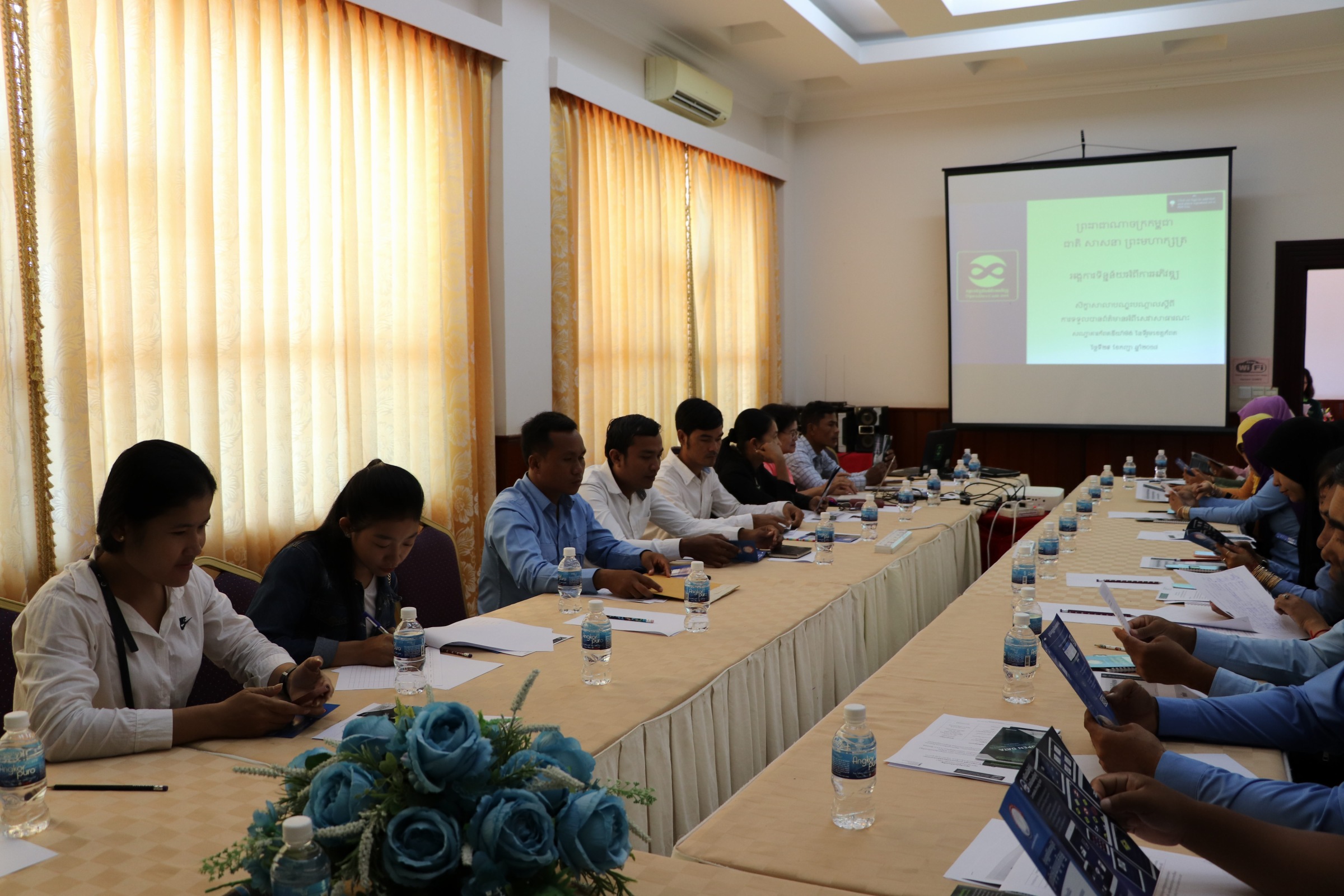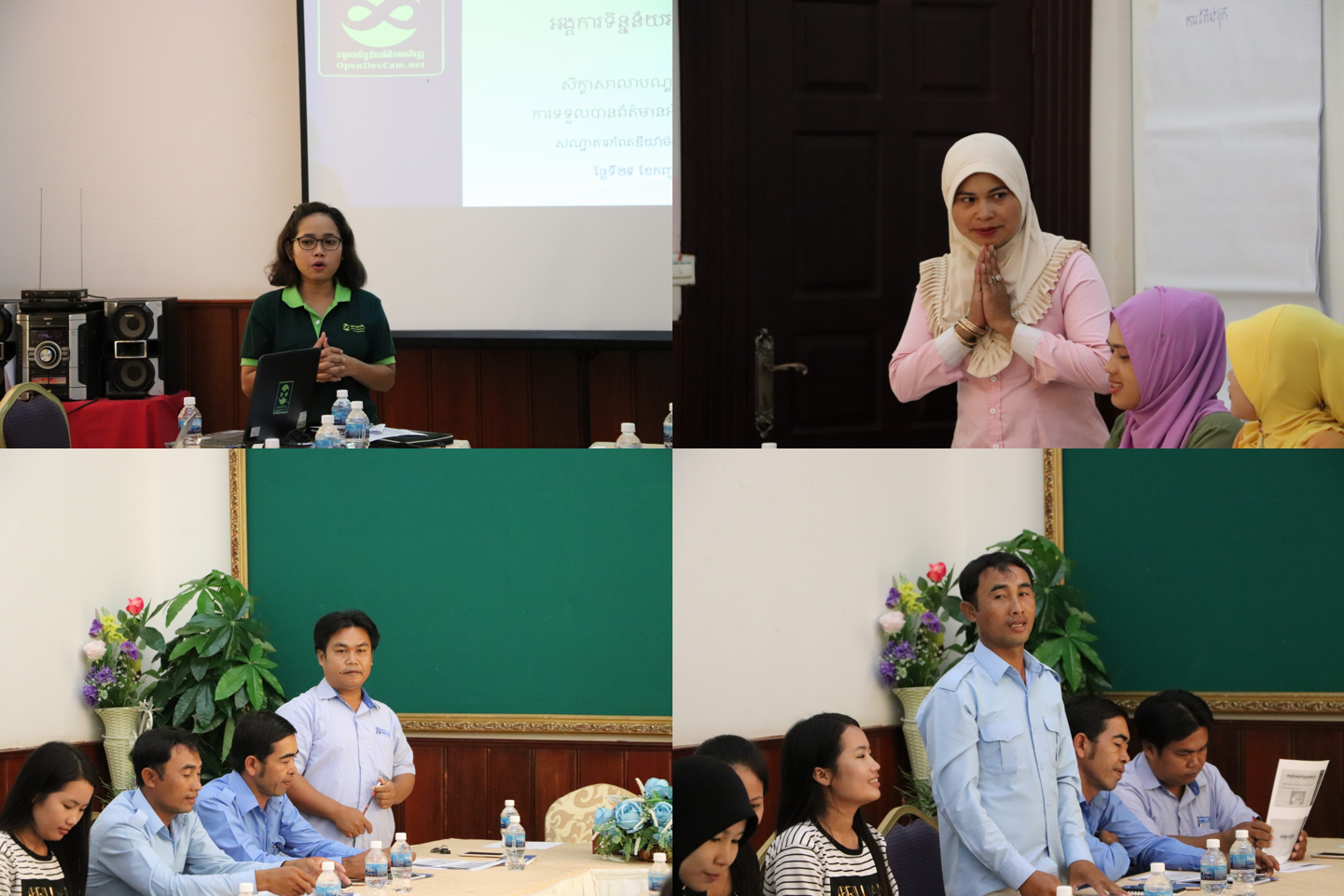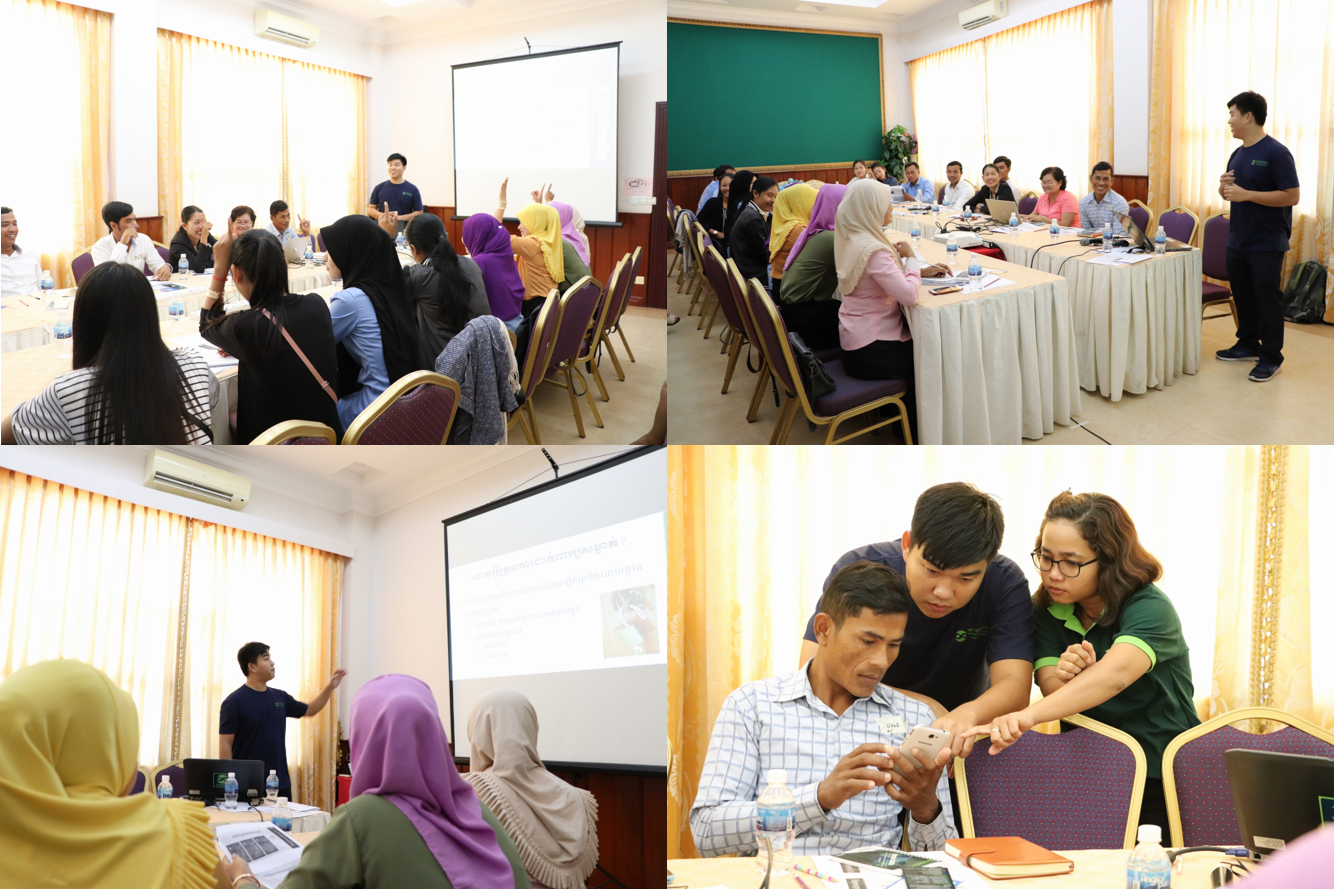សិក្ខាសាលាបណ្តុះបណ្តាលស្តីពី “ការទទួលបានព័ត៌មានអំពីសេវាសាធារណៈ”
នៅថ្ងៃទី២៩ ខែកញ្ញា ឆ្នាំ២០១៨ អង្គការទិន្នន័យអំពីការអភិវឌ្ឍ (អូឌីស៊ី) បានរៀបចំសិក្ខាសាលាបណ្តុះបណ្តាល ដើម្បីលើកកម្ពស់ការយល់ដឹងពី ការទទួលបានព័ត៌មានសេវាសាធារណៈ ដោយប្រើប្រាស់ឧបករណ៍ អាយស៊ីធី។ ក្នុងនាមជាស្ថាប័នរដ្ឋដែលប្តេជ្ញាធ្វើឱ្យប្រសើរឡើងនូវសេវាសាធារណៈ គណៈកម្មាធិការជាតិសម្រាប់ការអភិវឌ្ឍតាមបែបប្រជាធិបតេយ្យថ្នាក់ក្រោមជាតិ (គ.ជ.អ.ប) ត្រូវបានអញ្ជើញចូលរួម ដើម្បីចែករំលែកនូវគម្រោងដែលអនុវត្តដោយរដ្ឋាភិបាល។ អូឌីស៊ី បានសហការជាមួយ អង្គការ ភាពជាដៃគូសង្គមស៊ីវិលកម្ពុជា ដើម្បីអញ្ជើញអ្នកចូលរួមពីខេត្តកំពត និងខេត្តកែប។ អ្នកចូលរួមទាំងនោះ គឺជាសមាជិកនៃអ្នកស្ម័គ្រចិត្តសហគមន៍ ដែលធ្វើការជាមួយ អង្គការ ភាពជាដៃគូសង្គមស៊ីវិលកម្ពុជា និងអង្គការដៃគូគឺ អង្គការសាមគ្គី ដែលធ្វើការជាមួយសហគមន៍ផ្ទាល់។ ពួកគាត់ដើរតួជាអ្នកសម្របសម្រួលសហគមន៍ ដើម្បីបង្រៀនសហគមន៍ ពីតួនាទីរបស់ពួកគេ នៅក្នុងសេវាសាធារណៈ ការប្រែប្រួលអាកាសធាតុ និងបញ្ហាផ្សេងៗដែលពាកព័ន្ធនឹងសហគមន៍។ ការបណ្តុះបណ្តាលនេះ គាំទ្រថវិកាដោយ កម្មវិធីរបស់ប្រទេសស៊ុយអែតសម្រាប់វិស័យ ICT នៅក្នុងតំបន់កំពុងអភិវឌ្ឍន៍ (SPIDER) នៅក្រោមគម្រោង “ការធ្វើឱ្យប្រសើរឡើងនូវសេវាសាធារណៈតាមរយៈឧបករណ៍ អាយស៊ីធី”។

អ្នកចូលរួមកំពុងអានឯកសារដែលបានផ្តល់ជូន មុនពេលសិក្ខាសាលាចាប់ផ្តើម។
មុនពេលចាប់ផ្តើមចែករំលែកនូវខ្លឹមសារសំខាន់ៗ នៅក្នុងការបណ្តុះបណ្តាលនេះ គឺមានការស្វាគមន៍ពីក្រុមការងាររបស់អូឌីស៊ី និងការណែនាំខ្លួនពីអ្នកចូលរួមក្នុងសិក្ខាសាលានេះ។ បន្ទាប់មក អ្នកចូលរួមត្រូវបានស្នើឱ្យចែករំលែកការរំពឹងទុករបស់ពួកគេពីសិក្ខាសាលាពេញមួយថ្ងៃនេះ។ ពួកគេសង្ឃឹមថា បន្ទាប់ពីការបណ្តុះបណ្តាលនេះ ពួកគេនឹងទទួលបានចំណេះដឹង និងបទពិសោធន៍ពីសេវាសាធារណៈ និងការប្រើឧបករណ៍អាយស៊ីធី និងវិធីរក្សាសុវត្ថិភាព លើប្រព័ន្ធអ៊ីនធឺណិត។ ជាពិសេស អ្នកចូលរួមមួយចំនួនបាន បង្ហាញថា ការបណ្តុះបណ្តាលនៅថ្ងៃនេះ នឹងរួមចំណែកដល់តួនាទីរបស់ពួកគេជាអ្នកស្ម័គ្រចិត្តសហគមន៍ ដើម្បីយល់ដឹងពីសេវាសាធារណៈ និងកន្លែងដែលត្រូវស្វែងរកព័ត៌មាន ដែលពាក់ព័ន្ធ និងដើម្បីឱ្យពួកគេចែករំលែកចំណេះដឹងនេះ ជាមួយសហគមន៍មូលដ្ឋានដែលពួកគេធ្វើការជាមួយ។

អ្នកចូលរួមម្នាក់ៗកំពុងធ្វើការណែនាំខ្លួនទៅកាន់អ្នកចូលរួមដទៃទៀត។
ខ្លឹមសារដំបូងដែលចែករំលែកជាមួយអ្នកចូលរួមគឺ “ការប្រើប្រាស់ប្រព័ន្ធអ៊ិនធឺណិត និងសុវត្ថិភាពសង្គម” ធ្វើបទបង្ហាញដោយលោក សំអាន ម៉ារឌី ដែលជាជំនួយការអភិវឌ្ឍគេហទំព័រ នៅអង្គការអូឌីស៊ី។ ខ្លឹមសារមួយចំនួនដែលបានរួមបញ្ចូលក្នុងបទបង្ហាញនេះគឺ ការប្រើប្រាស់ឧបករណ៍អេឡិចត្រូនិច ការប្រើប្រាស់ និងការគ្រប់គ្រងពាក្យសម្ងាត់ ការប្រើប្រាស់អ៊ីម៉ែលដោយសុវត្ថិភាព និងការប្រើប្រាស់ប្រព័ន្ធផ្សព្វផ្សាយសង្គមដែលមានសុវត្ថិភាព។ អ្នកចូលរួមក៏បានចូលរួមយ៉ាងសកម្មផងដែរ ជាមួយបទបង្ហាញនៅពេលចាំបាច់ ដើម្បីឱ្យពួកគេអាចធ្វើតាមជំហានត្រឹមត្រូវ។ វគ្គនេះជួយអ្នកចូលរួមឱ្យរៀនពីឧបករណ៍ទំនាក់ទំនងតាមអ៊ិនធឺណិតដ៏សំខាន់មួយចំនួន ដែលមានប្រយោជន៍ចំពោះការងាររបស់ពួកគេ ក៏ដូចជាអនុញ្ញាតឱ្យពួកគេចេះការពារឯកជនភាពរបស់ពួកគេ ពីសកម្មភាពដែលមានគ្រោះថ្នាក់នៅលើអ៊ីនធឺណិត។

ក្រុមអង្គការអូឌីស៊ីកំពុងបង្ហាញអំពីការប្រើប្រាស់អ៊ីនធឺណិត និងសុវត្ថិភាពរបស់វានៅលើទូរស័ព្ទ។
វគ្គបន្ទាប់ត្រូវបានធ្វើឡើងជាមួយបទបង្ហាញស្តីពី “ការទទួលបានព័ត៌មានអំពីសេវាសាធារណៈ និងការប្រើប្រាស់ផែនទីនៅលើគេហទំព័ររបស់អូឌីស៊ី” ដោយកញ្ញា ថៅ ច័ន្ទធារីរ័ត្ន ជាបណ្ណាធិការ-អ្នកស្រាវជ្រាវ របស់អង្គការអូឌីស៊ី រួមជាមួយសៀវភៅណែនាំអំពីការប្រើប្រាស់ ដែលបានផ្តល់ជូនដល់អ្នកចូលរួម។ ធារីរ័ត្ន បានណែនាំអ្នកចូលរួមមួយជំហានម្តងៗ នៅលើគេហទំព័ររបស់អូឌីស៊ី ដូចជា ទំព័រការទទួលបានព័ត៌មានអំពីសេវាសាធារណៈ ទិន្នន័យនៃតម្លៃសេវានានារបស់រដ្ឋាភិបាល និងផែនទីរបស់អូឌីស៊ីស្តីពីសេវាសាធារណៈ។

ក្រុមការងារអូឌីស៊ី កំពុងបង្ហាញពីគេហទំព័រ អូឌីស៊ី ដល់អ្នកចូលរួម។

អ្នកចូលរួមកំពុងអនុវត្តការប្រាស់គេហទំព័រអូឌីស៊ី។
មិនយូរប៉ុន្មាន ក្រោយទទួលទានអាហារថ្ងៃត្រង់ សកម្មភាពបន្ទាប់សំខាន់មួយទៀត បានធ្វើឡើង ដោយអ្នកតំណាងរបស់រដ្ឋាភិបាលគឺ លោកជេ្ឋជ គីមជុង និងលោក សំរិទ្ធិ វណ្ណៈ ដែលអញ្ជើញមកពី គ.ជ.អ.ប។ លោក គីមជុង បានចាប់ផ្តើមដំបូងដោយផ្តល់ការណែនាំអំពីគ.ជ.អ.ប និងគម្រោង ISAF ។ គាត់បានបកស្រាយពីរបៀបដែលគម្រោងអនុវត្តដោយរដ្ឋាភិបាលនៅកម្រិតសហគមន៍មួយនេះ បានធ្វើឱ្យសេវាសាធារណៈទាំងបីរួមមាន សុខាភិបាល ការអប់រំ និងសេវារដ្ឋបាលឃុំសង្កាត់ ប្រសើរឡើង។ ខណៈពេលដែល គ.ជ.អ.ប ដើរតួក្នុងការផ្តល់ការគាំទ្រផ្នែកបច្ចេកទេសដល់អ្នកផ្តល់សេវា អង្គការដៃគូអភិវឌ្ឍន៍ទាំង៥ ផ្តល់ការគាំទ្រការអនុវត្តជាមួយអ្នកទទួលសេវានៅសហគមន៍។ បន្ទាប់ពីការធ្វើបទបង្ហាញទូទៅស្តីពី គម្រោងនៃការធ្វើឱ្យសេវាសាធារណៈប្រសើរឡើងដោយរដ្ឋាភិបាល លោក សំរិទ្ធ បានបង្ហាញពី គេហទំព័រ គ.ជ.អ.ប ដោយលើកឡើងចំណុចសំខាន់ពី ប្រព័ន្ធគ្រប់គ្រប់ទិន្នន័យ គ.ជ.អ.ប។ តួនាទីនីមួយៗនៃទិន្នន័យ ត្រូវបានពន្យល់ដោយផ្តោតលើទិន្នន័យ ISAF ដោយសារតែអ្នកចូលរូម មានការចាប់អារម្មណ៍លើព័ត៌មាននៅតំបន់របស់ពួកគេ ដូចជាចំណាយ និងចំណូលតាមឃុំ។ អ្នកចូលរួមមានការកោតសរសើរចំពោះ គម្រោង និងព័ត៌មាន នៅតាមតំបន់របស់ពួកគេ ដែលពិបាកនឹងរកពីមុនមក។ បទបង្ហាញនេះ ពិតជាមានសារៈសំខាន់ណាស់ សម្រាប់ការងាររបស់ពួកគេ ដើម្បីចែករំលែកដល់សហគមន៍របស់ពួកគេ ឬក៏ជាប្រភពសម្រាប់ផ្ទៀងផ្ទាត់ព័ត៌មាន អំពីសេវាដែលបានផ្តល់នៅក្នងសហគមន៍របស់ពួកគេ។

ក្រុមការងាររបស់ គ.ជ.អ.ប កំពុងបង្ហាញអំពីគម្រោង ISAF និងគេហទំព័ររបស់ គ.ជ.អ.ប ដល់អ្នកចូលរួម។
មុននឹងបញ្ចប់សិក្ខាសាលា ក្រុមការងារអង្គការអូឌីស៊ី បានបែងចែកអ្នកចូលរួមជា ៤ ក្រុម ដើម្បីធ្វើការពិភាក្សាជុំវិញរបៀបនៃការធ្វើបទបង្ហាញអំពីគេហទំព័រអូឌីស៊ី និងទំព័រព័ត៌មានសាធារណៈដល់ភាគីពាក់ព័ន្ធដទៃទៀត។ អ្នកដែលបានធ្វើបទបង្ហាញដ៏ល្អបំផុត នឹងត្រូវទទួលបាននូវអាវយឺត សៀវភៅសរសេរ និងកងដៃរបស់អូឌីស៊ី។

អ្នកចូលរួមកំពុងធ្វើបទបង្ហាញអំពីការទទួលបានព័ត៌មានអំពីសេវាសាធារណៈនៅលើគេហទំព័ររបស់អូឌីស៊ី។

អ្នកចូលរួមត្រូវបានផ្តល់ជូននូវអាវយឺត សៀវភៅសរសេរ និងកងដៃរបស់អូឌីស៊ីសម្រាប់ការធ្វើបទបង្ហាញរបស់ពួកគេ។

